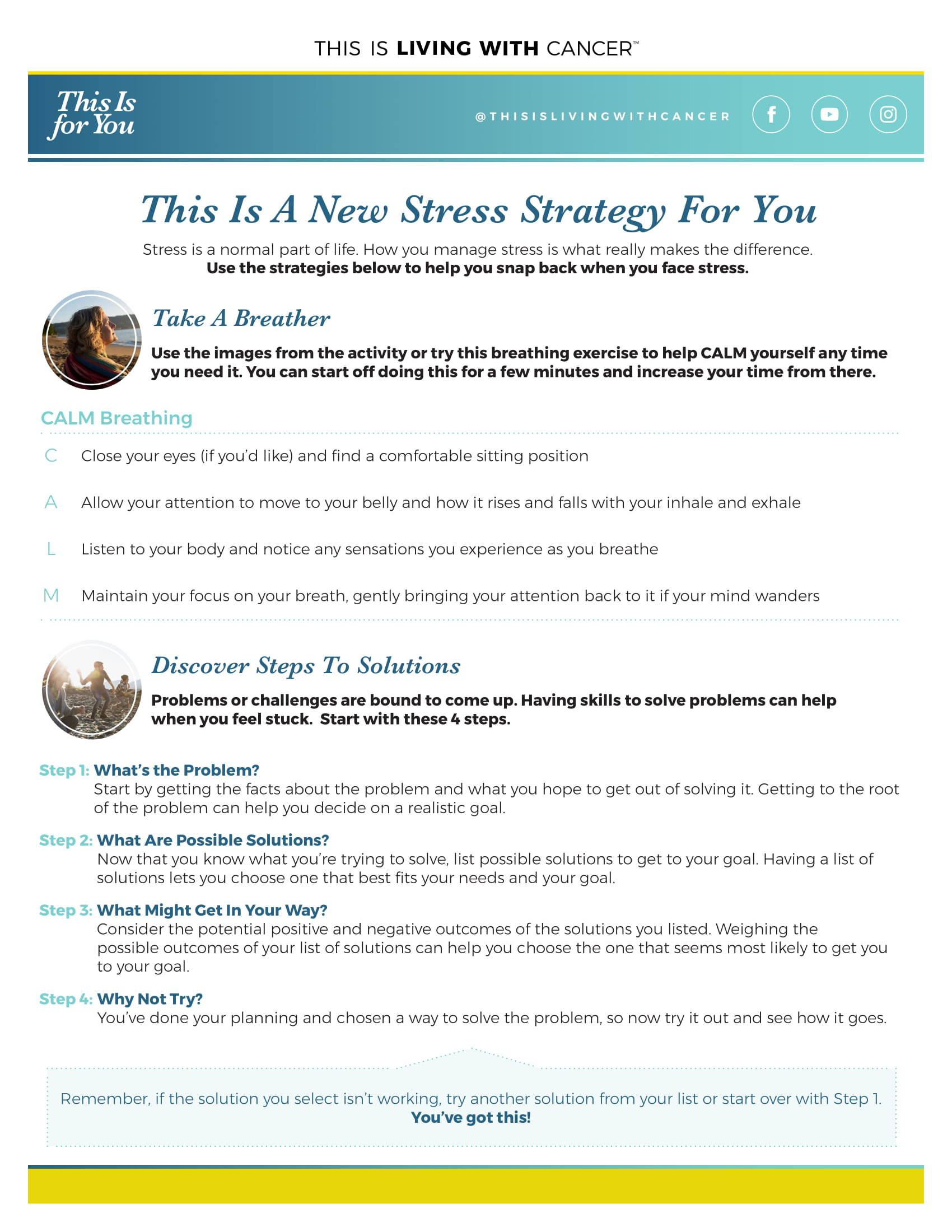Hi! Read about the 4 people below. While no one is just like you, pick the person you relate to the most and learn a new way to manage stress. You can always come back and explore the others to try different strategies.





Match your breathing with the movement of the image. Inhale as the image gets bigger, and exhale as it gets smaller again.
Try the different images, and you can even download the ones you like. Just right-click or tap and hold to save it to your device. That way, you can take a breather whenever you need it.
Problems or challenges are bound to come up. It's a normal part of everyday life. Having skills to solve problems can help when you feel overwhelmed and like you're facing an uphill battle. Notice how the mountain below reflects that feeling and how it changes as you take steps toward solutions.
Nice work. You learned new steps to solving problems. If the solution you select isn't working, consider another solution from your list or start over with Step 1. You've got this!
and what you hope to get out of solving it.
Select Step 2 to keep going.
Select Step 3 to keep going.
Select Step 4 to keep going.

Managing everyday life with cancer can be tough—so can caring for someone with cancer. It can be even harder if you think you can only rely on yourself. But reaching out for support isn't always easy when you've been feeling alone for a while. This can result in a cycle of thinking you can't rely on anyone but yourself, feeling down and lonely, and getting stuck instead of reaching out to others.
But what if you took a closer look at your thoughts and realized you were on autopilot? You may be able to shift your perspective and learn to seek support in different ways.

Have you ever stopped to think about what you think? It's not unusual to reply “not really.” Especially when stress pops up or things don't go as planned or hoped for. Those moments are when thoughts tend to go on autopilot, racing quickly and interfering with feelings and goals. Select each card below to learn more about 3 common types of automatic unhelpful thoughts.
Mountains and Molehills
This type of thinking amplifies negative experiences and downplays positive experiences.
Sweeping Statements:
This type of thinking takes evidence from one or a few negative experiences to draw quick conclusions without consideration.
Glass Half Empty:
This type of thinking focuses on the negative and uses that to judge future experiences.

Letting automatic negative thoughts take the lead can foster feelings of loneliness. This is because being on autopilot can make you feel stuck believing you have no support—whether or not you really do. Over time, these types of thoughts can create a cycle that results in increasing feelings of loneliness. Select each card below to learn more about how the 3 types of negative thoughts you've read about can make you feel.
This is an example of how Mountains and Molehills (exaggerating the negative and ignoring the positive) can play a role in feeling friendless.
This is an example of how Sweeping Statements (taking evidence from one negative experience to draw conclusions) can lead to feeling lonely.
This is an example of how Glass Half Empty (focusing on the negative) can add to feeling alone.

Next time you notice unhelpful thoughts like these, try a strategy for shifting your perspective. Select each card below to learn more about strategies you can try next time you notice negative thoughts starting to cycle, and see what works best for you.
Be a Thought Detective:
I will ask myself if the negative thought is 100% true or just a possibility. I don't have to listen to negative thoughts that are only possibilities, and I can consider new ways to look at the situation.
Investigate New Ideas:
If I find myself getting stuck in negative thoughts, I will take a moment to list other ways to see the situation and try to align my new perspective with the facts.
Stop Negative Thoughts in Their Tracks
If I'm feeling lonely and stuck in negative thoughts, I'll tell myself to stop and picture a big red STOP sign. Then, I will focus on something more positive, like planning something I enjoy.

When you shift your perspective, you can see new opportunities you may not have noticed before. And this may mean finding new ways to seek support when you need it. Consider the strategies you've learned, and see what works best for you.

When you're feeling overwhelmed, it's easy to be hard on yourself when you need to keep going. But you can find a better way. And it can help you grow stronger in the face of stress. Fill in the blanks below to find your way to be your best teammate—one that uses encouragement for motivation.

You're on your way! Continue filling in the blanks.

Excellent! You have found your way to be your own best teammate. That means encouraging yourself and building off your strengths in the face of stress. Use your story below as a reminder.
you are a @positive-word-describe-you person. Your friends really appreciate your @something-kind-friend-would-say-about-you. Things may be @negative-word-describe-hard-times at times, but your @strength-you-have will help you through. You can also lean on @someone-who-supports-you. On a bad day, say to yourself, @encouraging-phrase. And be sure to make time to @your-favorite-hobby.
This Is A New Stress Strategy For You
Stress is a normal part of life. How you manage stress is what really makes the difference. Use the strategies below to help you snap back when you face stress.
- Take A Breather
- Discover Steps To Solutions
- Shift Your Perspective on Support
- Be Your Best Teammate
You Did It!
Great job. You downloaded your This Is A New Stress Strategy For You. Use it to help you snap back from stress.
- Take A Breather
- Discover Steps To Solutions
- Shift Your Perspective on Support
- Be Your Best Teammate
On The Way!
Great job. Your This Is A New Stress Strategy For You tip sheet is on its way. Use it to help you snap back from stress.
- Take A Breather
- Discover Steps To Solutions
- Shift Your Perspective on Support
- Be Your Best Teammate





